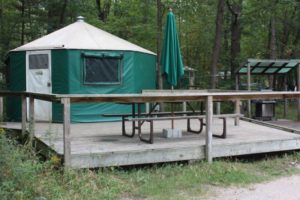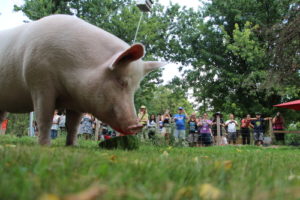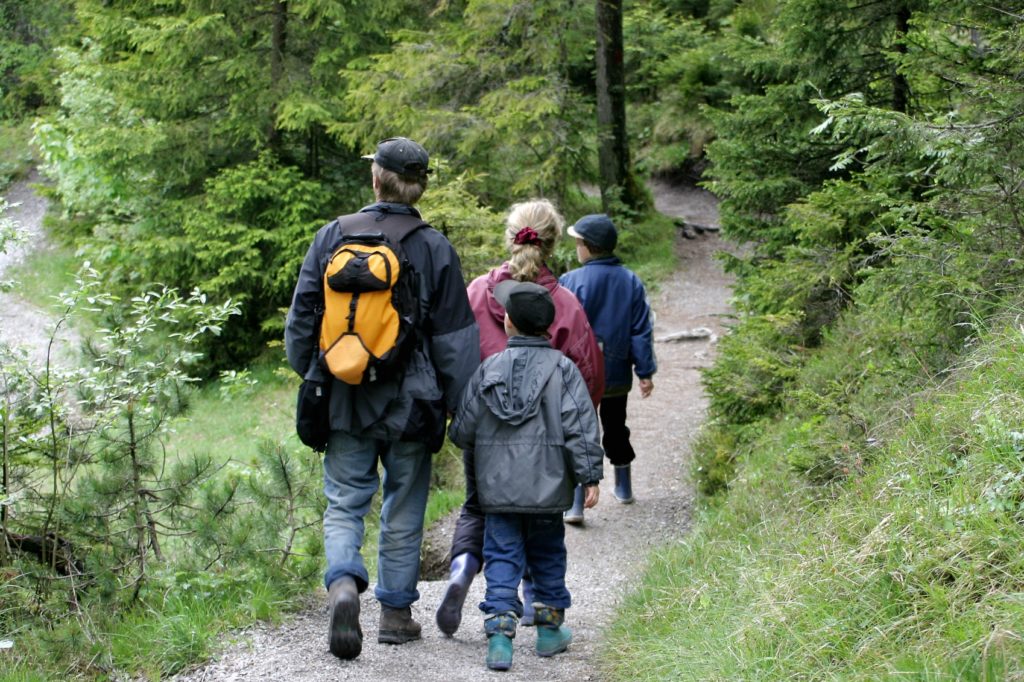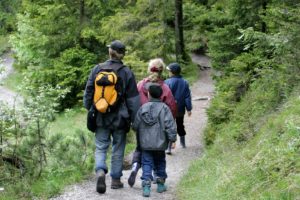Summer is here, school’s out and vacation season has officially begun. Whether you already have vacation plans or are still searching for the perfect trip or activity for your family to engage in this summer, considering the environmental impacts of your plans can be a great way to ensure a fun, safe and sustainable experience for all.
Here are just a few ideas for eco-friendly summer activities:
1. Plan a Stay-cation

Though the occasional jaunt across international waters can be fun (I’ll be the first to admit that my family’s European backpacking trip when I was a teen was one of our most memorable family experiences), regular air travel simply is not sustainable. The David Suzuki Foundation estimates that aviation accounts for 4-9% of the total climate change impact of human activity, and has a greater climate impact per passenger kilometer than other forms of transportation.(1) While a road trip is a better option, you can minimize your carbon footprint even more by planning a stay-cation.
Stay in a local B&B, explore places in your region that you’ve never been to before, and eat in/shop at local establishments. You can enjoy all the luxuries of a vacation and still support your local economy.
In Kitchener-Waterloo region, there is an awesome Eco B&B called Little City Farm. Not only do they provide a beautiful, organic environment to stay in but they are a fully operational urban homestead. Their breakfast is made from scratch with whole food ingredients (much of which was grown on or harvested from the property), and for a small extra fee they’ll make you a delicoius wood-fired pizza dinner in their hand-built, outdoor clay oven. If you’re not wanting to stay the night, they run monthly workshops on various aspects of urban homesteading that are totally worth checking out.
2. Go Camping
Camping isn’t for everyone, I know, but it can be one of the most eco-friendly (and affordable) vacations you’ll take this summer. I say ‘can be’ because camping can also be less than ideal for the environment. To make sure your camping trip is sustainable, try making it a waste-free trip. Pack food in advance in reusable containers and coolers with ice. Bring reusable travel mugs for morning coffee, and prepare to do dishes on your camp site (three wash basins work well – one for washing, one for rinsing and another for dry dishes).

Respect the campsite’s wood policy to ensure you’re preserving the nearby trees and not risking bringing in any invasive bugs.
Try camping in a tent, as campers and RVs can add to your carbon footprint especially if you’re already driving onto the site. A service-free site is also best, if you can live without the electricity. Water, of course, should always be available. If tent-living really isn’t for you, there are many provincial parks that offer yurts: small pre-built cabins with a door and sleeping arrangements not usually on the ground.
Finally, if someone in your family simply won’t camp then perhaps setting up a tent in the backyard for a fun, overnight retreat is best. Some of my best childhood memories are of my brother, dad and I ‘camping’ in the backyard while my mom enjoyed the comforts of our house.
3. Hike Local Trails
An eco-friendly idea for a day or half-day activity is to pick a local trail to hike. Kitchener-Waterloo has some amazing options. Huron Natural Area is a great family-friendly place with an important history and opportunities to teach kids about respecting the natural environment at every turn. Different looped trails offer options for every ability (including little legs and strollers), and the kids’ play area is built completely of natural wood and materials.
Another great option is to pick a starting point on the Grand River Trail and hike it. Preparing for the terrain in advance is important (ie. I learned the hard way when I tried to bike the steep gravel trail with a road bike. I ended up bringing my bike back home and hiking it instead). Here’s a MAP to help you find your way. If you access the trail at point 9 (M.R. Good Family Trailway) or 10 (Peter Hallman Family Trailway), you can hike North-West for approximately an hour and half and reach Bingemans for a cold drink and/or a game of mini-golf with the family before hiking back. *NOTE: the hike there is uphill and bit steep, but totally do-able.
4. Pack a Waste-Free Picnic
Another day-trip idea is to choose a local park and pack a waste-free picnic for lunch and/or dinner. The beauty of waste-free meals on a day-trip is that cleanup can wait until you get home.
Avoiding plastics is a great way to preserve your health while reducing your environmental impact. Stainless steel is a great option for plates, bowls, cups and cutlery. Corelle dishes are also fairly durable and could be packed in your picnic basket along with a separate reusable bag to put dirty dishes in when you’re done – this helps prevent the enter basket from getting sticky or dirty.
If you’re not up for doing dishes later, why not eat right out of the food containers? As long as you’re hanging out with a spouse and/or your kids, they probably won’t mind sharing.
Finally, use cloth napkins and a reusable water bottle for cleanup. Here’s an easy DIY project for no-sew cloth napkins to get you started.
5. Visit a Farm Sanctuary
Finally, if you’re an animal-lover a visit to a farm sanctuary is far kinder and easier on the environment than visiting a zoo or petting zoo. There are more than a couple of wonderful families who’ve started farm sanctuaries in Ontario, taking in abandoned, neglected, abused, and/or injured farm animals to ensure they get to live out their lives in peace.

Most santuaries offer the opportunity to do a work-visit where you get to interact with the animals while simultaneously helping out with farm chores. Being that farm sanctuaries are not-for-profit organizations often homing upwards of 20-30 animals, they need all hands on deck to ensure the animals are safe and happy.
Farm sanctuaries are a great place for kids to learn about compassion toward animals, too and many in Ontario host annual open houses and/or visitation days. Cedar Row in the Stratford area will be hosting their annual open house on Saturday, June 9th; Happily Ever Esther in the GTA hosts monthly public tours and weekly volunteer days; and PieBird in Nippising offers workshops (including one on how to build your own yurt!) as well as a Vegan Farmstay opportunity in their Eco-B&B.
I hope this post has inspired you to try something new in working toward your goal of a more eco-friendly summer!
Here’s to new adventures.
REFERENCES

